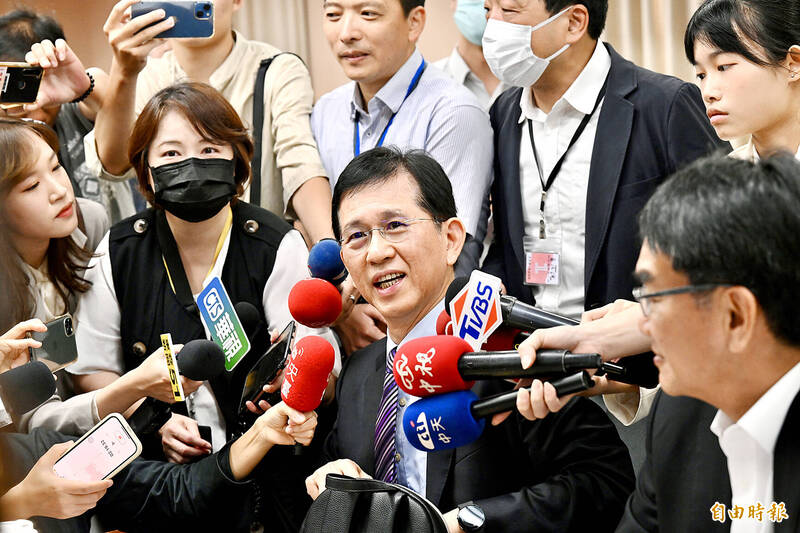《TAIPEI TIMES》 Ministry to build fraud-reporting system

Minister of Digital Affairs Huang Yen-nun speaks to reporters at a meeting of the legislature’s Transportation Committee in Taipei yesterday. Photo: Lo Pei-de, Taipei Times
CHECK AND REPORT: People can submit messages they believe to be scams, and the system would use artificial intelligence to analyze the content, the digital minister said
By Shelley Shan / Staff reporter
The Ministry of Digital Affairs aims to establish within three months a platform for people to report suspected fraudulent information found online, Minister of Digital Affairs Huang Yen-nun (黃彥男) said yesterday, as lawmakers questioned the ministry’s response to fraudulent advertisements.
In his first presentation to the legislature’s Transportation Committee since being sworn in last week, Huang laid out his three policy goals of fighting fraud, bolstering national digital resilience and developing the digital economy.
Huang made a series of ambitious pledges, from training 1,000 cybersecurity specialists within two years to generating NT$1 trillion (US$31.07 billion) in output value from the digital economy.
However, legislators on the committee focused mostly on the government’s progress in curbing online fraud, particularly that which involved fake products or ads using the names or likenesses of celebrities without their consent.
Citing National Police Agency data, Taiwan People’s Party Legislator Lin Kuo-cheng (林國成) said that the number of fraud cases has risen from about 23,000 in 2019 to about 38,000 last year, while the amount of money lost through fraud during that period soared from NT$4.29 billion to NT$8.944 billion.
Lin asked Huang if he can offer better solutions to deter fraud.
Meanwhile, Democratic Progressive Party Legislator Lin Chun-hsien (林俊憲) said that even though the Criminal Police Bureau had issued 107 administrative rulings asking online platform operators to remove more than 100,000 investment fraud advertisements, the same ads later reappeared.
“This shows that operators are only passively tackling fraudulent ads on their platforms. They forgot that they have a responsibility toward society apart from selling ads for money,” Lin Chun-hsien said.
Currently, only advertisers of political content are required to register with their real names, but that rule does not apply to those posting commercial ads.
“The ministry needs to ask platform operators to regulate themselves. You need to toughen up on this matter, or they would not be afraid of you. You have nothing to fear because justice is on your side,” Lin Chun-hsien said.
Huang said he hoped lawmakers would quickly pass a draft act on fraud prevention and control during this legislative session, which would provide the legal basis for the ministry to require companies such as Facebook, Google and Line to have legal representatives in Taiwan and comply with the government’s anti-fraud regulations.
Platform operators who fail to comply could face a fine of up to NT$25 million or the suspension of their business if it is a serious offense, the draft act says.
Meanwhile, the ministry would within three months build a platform for people to report suspected fraudulent text messages or e-mails, he said.
“We would then use artificial intelligence to analyze the content. If the content is deemed to be suspicious, we would relay them to other government agencies, depending on the content of the messages,” he said.
The Taiwan Network Information Center can also help block fraudulent Web sites, he added.
“People can continue to use the 165 anti-fraud hotlines to report fraud if they have been scammed or if the information they received has been confirmed to be a scam. If they are not sure whether a message they receive is fraudulent, they can post it on the platform we are creating to check it,” Huang said. “If the message turns out to be fraudulent, we will forward it to the police. People would not need to report it to the police again.”
Since amendments to the Electronic Signature Act (電子簽證法) have been passed, online platform operators can only display ads if they have secured electronic signatures from the advertisers, which would help prevent people from being deceived by ads fraudulently using the likenesses of celebrities.
Deputy Minister of Digital Affairs Lin Yi-jing (林宜敬) said that in a meeting with platform operators last week, they told him that they need to follow laws stipulated by the countries in which their parent companies are based and need about a year to update their systems.
“I also told them that they need to follow laws in Taiwan if they are doing business here,” he said.
新聞來源:TAIPEI TIMES














